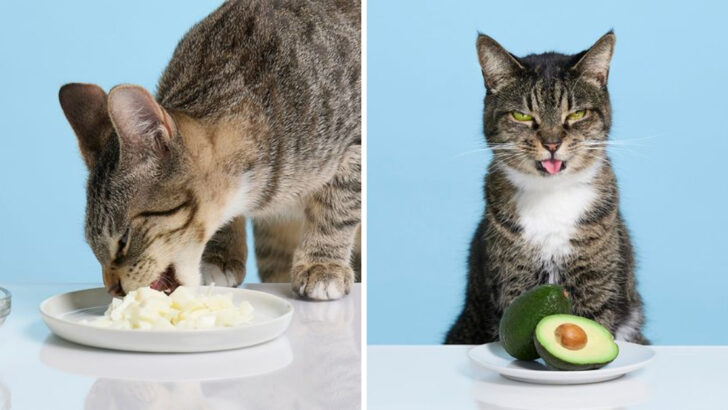Cats may have nine lives, but the wrong food can shorten every single one of them.
What you put in your feline’s bowl matters more than you think. Some foods keep them sleek, energetic, and purring with satisfaction. Others? Let’s just say they belong in a trash can far away from your cat’s curious whiskers.
With so many options—grain-free, raw, wet, dry—it’s easy to get lost in a sea of fancy labels and marketing gimmicks. But don’t worry! We’re cutting through the confusion to bring you the absolute best foods to keep your cat happy and healthy.
And because not everything that says “for cats” should be eaten by cats, we’re also calling out five foods that could do more harm than good.
Salmon

Rich in omega-3 fatty acids, salmon is a delectable treat for your feline friend. Its oily texture and flavorful taste make it a favorite among cats. Not only does salmon promote a shiny coat, but it also supports brain health.
Serve it cooked and free from any seasonings or oils. Ensure the fish is boneless to prevent choking hazards.
When choosing to add salmon to your cat’s diet, moderation is key. This tasty fish provides health benefits when served once in a while, complementing their regular meals.
Chicken

For cats, chicken is a lean, protein-rich option that aids in muscle development and energy levels. Its tender texture and mild flavor are often a hit with even the pickiest eaters.
Always ensure chicken is cooked thoroughly and free from bones or skin.
A simple preparation without spices or seasonings is safest. This easy-to-digest protein source is a staple in many feline diets, providing essential nutrients without the extra calories. Chicken serves as a versatile base for homemade cat meals.
Pumpkin

Pumpkin is a fiber-rich food that aids in digestion and helps manage hairballs in cats. Its natural sweetness and smooth texture are often appealing to their taste buds.
When feeding pumpkin to your cat, opt for cooked or canned versions without added sugars or spices.
Offering a spoonful as a treat or mixing it with other foods can support a healthy gut. This vibrant vegetable is a digestive aid that adds variety to your cat’s diet.
Spinach

Packed with vitamins and minerals, spinach is a leafy green that benefits a cat’s overall health. It’s a great source of vitamins A, B, C, and K, promoting strong bones and immune function.
Serve it steamed and chopped to make it easier for your cat to digest.
While spinach provides numerous health benefits, it should be offered in moderation due to its oxalate content. This vegetable adds a nutritious touch to a well-balanced feline diet.
Blueberries

Blueberries, small and juicy, are a surprising superfood for cats. Rich in antioxidants, these berries support their immune system and overall well-being.
Offering blueberries as an occasional treat can add a fun twist to their diet.
However, ensure they are washed thoroughly and served in small quantities. While cats may not be drawn to fruits naturally, blueberries can be a delightful, healthy surprise when introduced properly.
Carrots

Carrots, with their crunchy texture, are not only fun but also nutritious for cats. They are rich in beta-carotene, which converts to vitamin A, crucial for good vision and immune function.
Serve carrots cooked and mashed to make them easier to chew and digest.
Carrots add a splash of color and a dose of nutrients to your cat’s meal, making them a vibrant choice for special occasions.
Turkey

Turkey, similar to chicken, is another lean protein that’s beneficial for cats. It’s packed with nutrients like phosphorus and B vitamins, supporting their energy and metabolism.
Serve turkey cooked and plain, ensuring it’s free from bones and skin.
This protein-packed option provides variety in their diet, helping maintain muscle mass and overall vitality. Turkey is a delightful, festive treat for your feline friend.
Eggs

Eggs are a nutritious addition to a cat’s diet, packed with proteins and amino acids essential for muscle health. Feeding plain, cooked eggs provides a boost of energy and nutrients.
Serve scrambled or boiled without any seasoning.
This versatile food is easy to prepare and digest, making it a convenient treat. Eggs can be a regular part of a balanced diet, but moderation is crucial to avoid cholesterol issues.
Cheese

Cheese, with its creamy texture, is an occasional treat many cats enjoy. It’s a source of calcium and protein, but should be offered sparingly due to lactose content.
Serve mild varieties like cheddar or Swiss in small amounts.
For lactose-sensitive cats, cheese should be avoided. Offering cheese as a rare treat can add flavor to their diet while ensuring it does not become a staple.
Apples

Apples, crisp and juicy, can be a refreshing treat for cats when served in moderation. They are high in fiber and vitamin C, supporting immune health.
Offer apples peeled and deseeded to prevent any digestive issues.
This fruit adds a touch of sweetness and crunch, offering a different texture to explore. However, ensure that apples remain an occasional treat to avoid overconsumption of sugars.
Oatmeal

Oatmeal is a fiber-rich food that supports digestive health in cats. It’s also an excellent source of iron and vitamin B.
Serve it plain and cooked, avoiding any added sugars or flavors.
This simple, nutritious meal option can be mixed with other foods, providing a comforting texture and taste. Oatmeal serves as a healthy addition to a balanced diet.
Peas
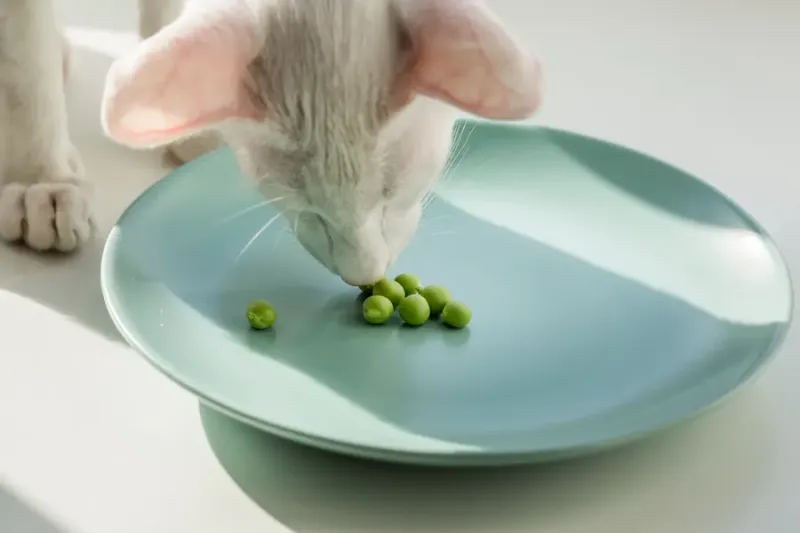
Peas are small yet packed with nutrients, providing vitamins A, B1, C, and K. They add a pop of color and nutritional value to a cat’s diet.
Offer cooked peas to make them easier to digest, blending them with their regular meals.
These little legumes enhance the diet with plant-based proteins and fibers, supporting overall health. Peas can be a fun addition to your cat’s menu.
Liver

Liver, rich in iron and vitamin A, is a favorite among cats due to its strong aroma and taste. This nutrient-dense organ meat supports blood health and energy.
Serve liver cooked and in moderation to avoid vitamin A toxicity.
While liver can be an enticing treat, it should complement a balanced diet. This savory delight is best served occasionally, adding a gourmet touch.
Canned Tuna
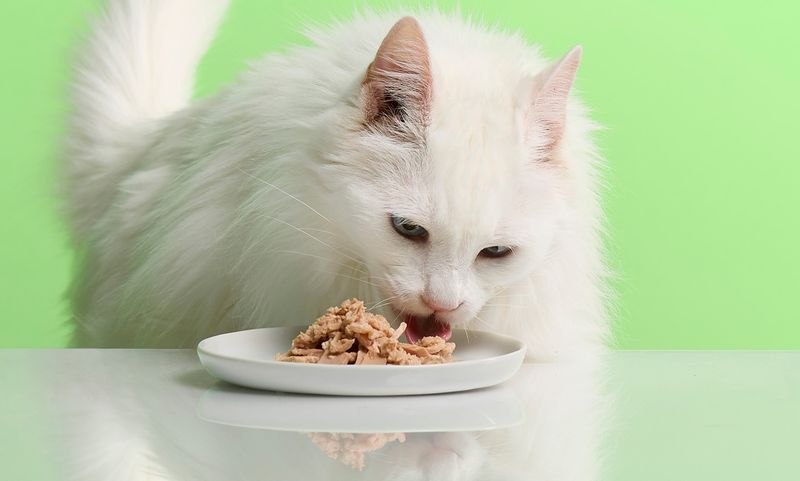
Canned tuna, known for its rich flavor, is an appealing treat for many cats. It’s high in proteins and omega-3 fatty acids, supporting coat and heart health.
Offer in moderation and ensure it’s packed in water, not oil or brine.
While tuna can be enticing, it should not replace a balanced diet due to potential mercury content. As a rare treat, it adds excitement to a feline’s meal occasion.
Grapes and Raisins
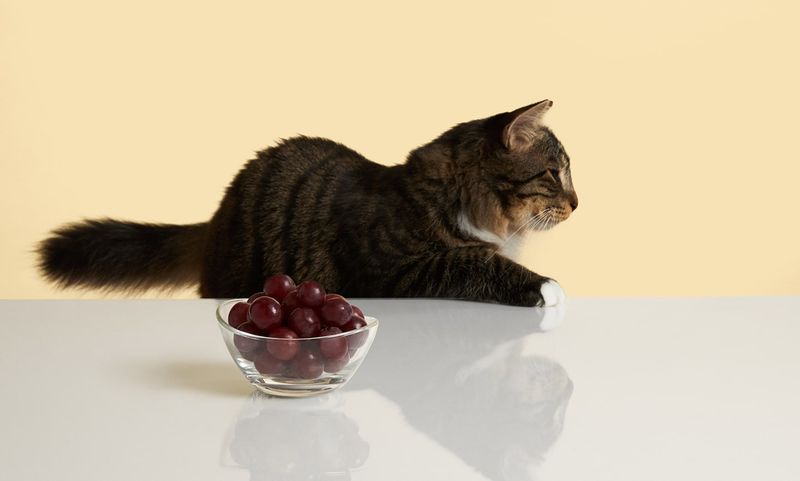
Grapes and raisins, while seemingly harmless, can be toxic to cats. Even small amounts can cause kidney failure, so it’s crucial to keep these fruits away from your furry friend.
Symptoms of poisoning may include vomiting, lethargy, and reduced appetite.
If ingestion occurs, seek veterinary assistance immediately. Avoid leaving grapes or raisins accessible to pets, ensuring their safety.
Onions and Garlic
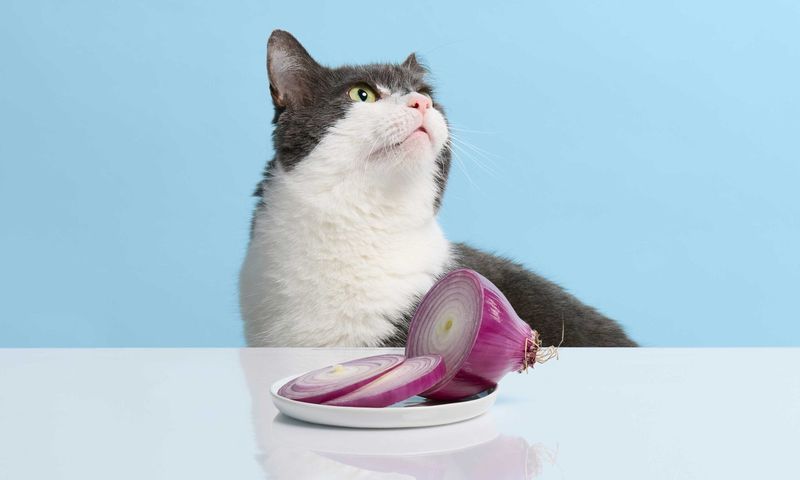
Onions and garlic, widely used in human cuisine, are harmful to cats. They contain compounds that can damage red blood cells, leading to anemia.
Both raw and cooked forms are dangerous, so it’s important to keep them out of your cat’s diet.
Even small amounts can have adverse effects, making vigilance essential. Maintaining a safe and onion-free environment ensures your cat’s health.
Chocolate

Chocolate, a delightful treat for humans, is toxic to cats. Theobromine and caffeine, present in chocolate, can cause serious health issues.
Symptoms of chocolate poisoning include vomiting, tremors, and seizures.
Prevent exposure by storing chocolate safely out of reach. In case of accidental ingestion, immediate veterinary care is crucial to ensure your pet’s safety.
Alcohol

Alcohol, even in small quantities, is dangerous to cats. It affects the central nervous system, leading to symptoms like vomiting, disorientation, and even coma.
Keep alcoholic beverages and foods containing alcohol far from your pet’s reach.
Vigilance is key in preventing accidental ingestion, ensuring your feline companion remains safe and healthy.
Raw Eggs
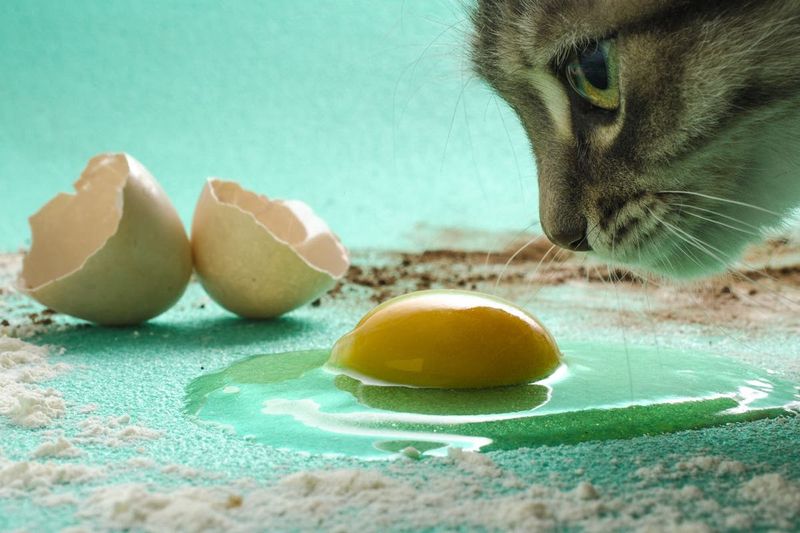
Raw eggs, though nutritious when cooked, pose risks due to potential bacteria like Salmonella. They also contain avidin, inhibiting biotin absorption, affecting skin and coat health.
Serve only cooked eggs to avoid these dangers.
Proper preparation ensures the safety and well-being of your cat, making eggs a delightful, safe treat when handled correctly.
Avocado

Avocado contains persin, which can be toxic to cats and cause gastrointestinal distress. Its high-fat content can also lead to pancreatitis if consumed in large amounts.
Avoid sharing avocado with your cat to prevent health issues.
Awareness of this common fruit’s risks ensures your pet’s safety, maintaining their health and happiness.

